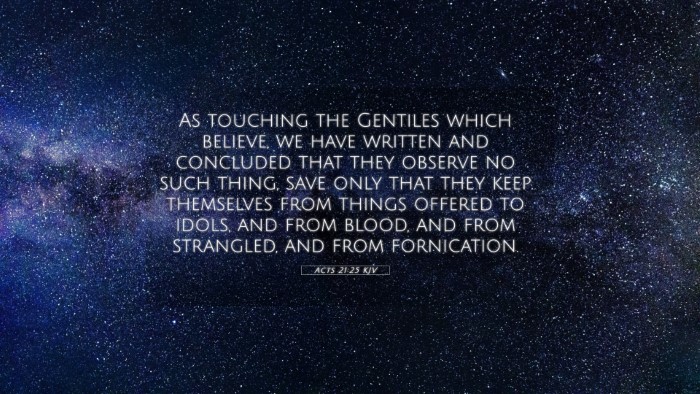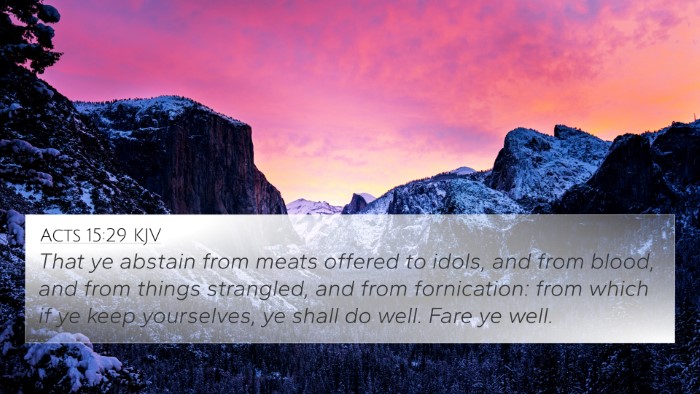Understanding Acts 21:25
Acts 21:25 states, "But concerning the Gentiles who believe, we have written and decided that they should observe no such thing, except that they should keep themselves from things offered to idols, from blood, and from things strangled, and from sexual immorality."
Summary of Meaning
This verse is crucial for understanding the early church's approach to Gentile converts. The apostles deliberated on the necessity of imposing Jewish law upon Gentile believers, ultimately concluding that only a few basic prohibitions were necessary.
Insights from Public Domain Commentaries
-
Matthew Henry:
Henry emphasizes the unity of the church across cultural lines. He notes that the decision reflects God’s grace, showing that salvation is not limited by adherence to Jewish customs but is available to all who believe in Christ.
-
Albert Barnes:
Barnes focuses on the nature of the restrictions placed on the Gentiles. He suggests that these prohibitions serve to maintain ethical standards and encourage harmony between Jewish and Gentile believers, highlighting the importance of understanding and respecting different cultural backgrounds within Christianity.
-
Adam Clarke:
Clarke points out that the directives to avoid particular practices stem from a desire to prevent moral corruption and to foster an environment of spiritual growth. He emphasizes that these rules were not about legalism but about loving one’s neighbor and maintaining fellowship.
Key Themes
- Grace over Law: The apostles recognize that Gentiles are not bound by the Mosaic Law, emphasizing salvation through faith alone.
- Unity in Diversity: This decision illustrates the early church's commitment to inclusivity while maintaining core ethical teachings.
- Guidelines for Ethical Living: The prohibitions highlight essential moral discernment for all believers to uphold their witness in a diverse world.
Cross-References
Acts 21:25 connects with several other Bible verses that deepen the understanding of this passage. Here are seven cross-references:
- Acts 15:28-29: The apostles’ decision to send similar instructions regarding what Gentiles should avoid.
- Romans 14:1-3: Discusses the acceptance of those who are weak in faith and how they should not be judged.
- 1 Corinthians 8:4-13: Addresses the issue of eating food sacrificed to idols and the freedom of believers.
- Galatians 5:1: Speaks to the importance of standing firm in freedom and not being burdened again by a yoke of slavery.
- 1 Thessalonians 4:3-5: Encourages believers to abstain from sexual immorality and to live honorably before God.
- Revelation 2:14: Warns against things sacrificed to idols, reflecting ongoing issues in the early church.
- Matthew 5:17-20: Jesus’ affirmation that He came to fulfill the Law, not abolish it, providing context for understanding law and grace.
Application and Reflection
The implications of Acts 21:25 for today’s believers are profound. It calls for a thoughtful approach to cultural differences within the church, urging believers to prioritize unity and mutual respect while adhering to core Christian ethics.
Tools for Studying Bible Cross-References
Understanding verses like Acts 21:25 can be significantly enhanced through the use of various tools:
- Bible Concordance: A valuable resource for locating specific words and their occurrences across scripture.
- Bible Cross-Reference Guide: These guides can facilitate deeper study by linking relevant scriptures thematically.
- Online Bible Study Platforms: Many websites provide tools for cross-referencing and thematic searches.
- Commentaries: Works by scholars can provide insights and applications, enriching one's understanding of scripture.
- Study Group Discussions: Engaging with others can often reveal insights and connections not initially apparent.
Concluding Thoughts
Acts 21:25 demonstrates early Christian leaders' willingness to adapt and respond to the needs of a diverse community. This principle is vital for contemporary believers as they navigate faith in a pluralistic world. Cross-referencing biblical texts, understanding thematic connections, and applying the lesson of unity amid diversity serve as a foundation for living out the Christian faith today.




